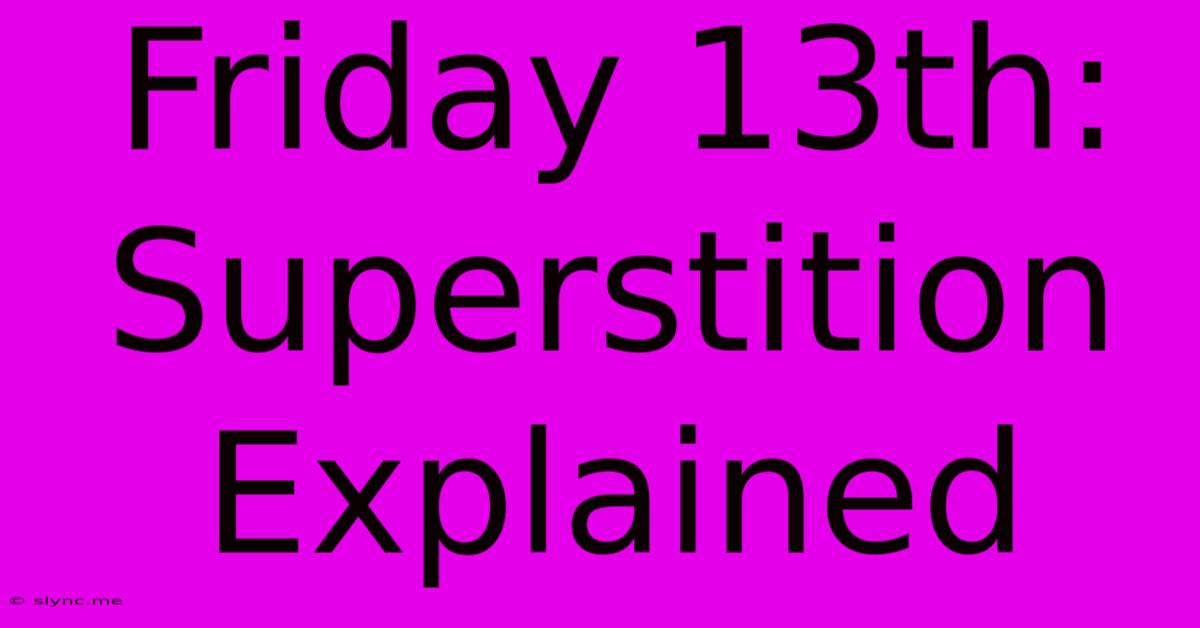Friday 13th: Superstition Explained

Discover more detailed and exciting information on our website. Click the link below to start your adventure: Visit Best Website Mrs.Amykhan. Don't miss out!
Table of Contents
Friday the 13th: Superstition Explained
Friday the 13th. Just the phrase conjures images of black cats, broken mirrors, and a general sense of unease. But where does this pervasive superstition originate? Is there any real reason to fear this seemingly unlucky day, or is it all just harmless folklore? Let's delve into the history and psychology behind the fear of Friday the 13th, also known as friggatriskaidekaphobia.
The Roots of the Fear: History and Mythology
The origins of Friday the 13th's ominous reputation are complex and intertwined with various historical and mythological factors. While no single event definitively cemented the day's bad luck status, several contributing factors emerged over centuries:
Religious Connotations:
-
Good Friday: The crucifixion of Jesus Christ is traditionally associated with Good Friday, which falls on a Friday. This deeply ingrained religious association linked Friday with tragedy and sorrow for many Christians.
-
Number 13: The number 13 itself holds a long history of negative associations. In Norse mythology, there were 12 gods at a feast when a 13th, Loki, arrived and caused the death of Baldr, a beloved god. This, combined with the belief that 13 guests at a table brought misfortune, strengthened the negative connotation.
Historical Events:
While no single, universally acknowledged event directly ties Friday the 13th to widespread disaster, the association likely solidified over time through the accumulation of unfortunate events that occurred on this date. The human tendency to remember coincidences reinforces superstitious beliefs.
The Psychology Behind Friggatriskaidekaphobia
The fear of Friday the 13th isn't just about historical events; it's also deeply rooted in human psychology:
-
Confirmation Bias: People tend to remember and focus on events that confirm their existing beliefs. If someone believes Friday the 13th is unlucky, they're more likely to notice and recall negative events that occur on that day, reinforcing their fear.
-
Apophenia: This is the tendency to see patterns or connections where none exist. An unfortunate event happening on Friday the 13th might be seen as a direct result of the date, even if it's purely coincidental.
-
Cognitive Biases: Our brains are wired to identify and avoid threats. Superstitions, even seemingly irrational ones, can offer a sense of control and predictability in an uncertain world. Observing superstitions like avoiding activities on Friday the 13th can offer a sense of ritualistic reassurance.
Is There Any Real Danger?
The simple answer is no. There's no scientific evidence linking Friday the 13th to a statistically significant increase in accidents, misfortunes, or other negative events. The perceived risk is purely psychological.
However, the belief itself can have real-world consequences. Some people experience genuine anxiety and stress on this day, leading to decreased productivity or even avoidance of activities. This demonstrates the power of the placebo effect in reverse – a negative expectation can manifest as negative consequences.
Overcoming Friggatriskaidekaphobia
If you find yourself experiencing anxiety related to Friday the 13th, there are ways to manage it:
- Rationalize your fears: Acknowledge that the fear is based on superstition, not fact.
- Challenge negative thoughts: Actively replace negative thoughts with positive affirmations.
- Exposure therapy (gradually): Start by acknowledging Friday the 13th without engaging in avoidance behaviors.
- Cognitive Behavioral Therapy (CBT): A therapist can help identify and change negative thought patterns.
Ultimately, Friday the 13th is a fascinating example of how superstition, history, and psychology can intertwine to create a powerful, albeit unfounded, fear. Understanding the roots of this superstition can help us appreciate its cultural significance while mitigating its potentially negative impact on our lives. So, while you might want to keep an eye out for black cats, remember that the real danger on Friday the 13th lies only in the power of belief itself.

Thank you for visiting our website wich cover about Friday 13th: Superstition Explained. We hope the information provided has been useful to you. Feel free to contact us if you have any questions or need further assistance. See you next time and dont miss to bookmark.
Also read the following articles
| Article Title | Date |
|---|---|
| Australias Geminid Meteor Shower Weekend | Dec 13, 2024 |
| Le Bron James Absence Lakers Stars Status | Dec 13, 2024 |
| Vshanuvannya Pam Yati Vistavka V Kropivnitskomu | Dec 13, 2024 |
| Australian Sky Meteor Shower Weekend | Dec 13, 2024 |
| Meteor Shower Lights Up Australian Sky | Dec 13, 2024 |
